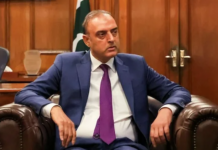The Finance Division has described as “incorrect” the impression created in a section of the media that Pakistan’s economy is shrinking.
In a statement issued on Friday, the Finance Division has asserted that the macroeconomic adjustment policies introduced by the government to support the balance of payment and strengthen the market confidence will also ensure higher and inclusive growth.
“The contention of a section of the media talking about ‘shrinking economy’ seems incorrect as the early signs of recovery of economic activities in the fiscal year 2020 are very much encouraging,” it maintained.
On the agriculture front, the federal government is implementing a “National Agriculture Emergency Programme” and has approved eight mega projects at the cost of Rs235 billion. This will encourage economic activities in rural areas and create employment opportunities in the country. Credit to the agriculture sector has increased by 20.7pc; the sowing of cotton crop has also increased by 14.4pc as compared to last year. The import of agriculture machinery recorded a growth of 8.7pc during FY19 which is a good indicator. The base effect will also support growth in agriculture.
Earlier estimates of cotton crop suggest that cotton production would increase at least by 3 million bales in FY20 from the last year. All these developments forecast that agriculture is likely to rebound and grow more than 3pc in the current financial year. This is likely to boost growth in large-scale manufacturing as well as the country’s exports. Similarly, LSM is likely to recover in the current fiscal year on the back of better than expected growth in the agriculture sector coupled with government initiatives in the construction, SMEs, tourism and automobile sectors. Better growth in agriculture and LSM sector is likely to have a good impact on the services sector.
To boost jobs in the industrial sector, the government is providing a series of focused subsidies and incentives to the industrial sector. These include subsidies to industry for electricity and gas, export development package and continuation of Long-Term Trade Financing (LTFF) and Export Refinancing Scheme (ERS) at subsidised rate.
Impact of better cotton production and subsidy schemes have a spillover effect on export growth and textile sector which will further support the current account and balance of payments position.
For inclusive growth and to protect the vulnerable segments of the society, various social protection programmes (through the newly-created poverty alleviation division) have been introduced. Under Poverty Alleviation, the government has allocated an additional amount of Rs80 billion in the country’s social protection spending for 2019-20 which cumulatively reached Rs190 billion. This will also have a spillover effect on private sector activities.
The editor further stated that “the government will have to request the IMF for waivers due to its failure in achieving two performance targets i.e. tax collection and circular debt. This is, according to the editorial, due to failure of both the government and the fund to do their homework before setting targets for the IMF programme signed by the government in June this year”.
It is clarified that the government has pursued the performance targets of the EFF programme vigorously during the first quarter of CFY. Resultantly, tax collection during the period has so far been 16pc higher than the tax collection of the same period last year. It is also clarified that the numbers regarding circular debt have not been finalised as yet and it is premature to say that the target has not been achieved and that the price hike has not worked.
As far as investment in domestic securities by non-residents is concerned, it may be noted that this is a positive development. This will expand and diversify the investor base and enhance competition, leading to liquidity in primary as well as secondary markets.
Over the long-run, greater competition among investors and greater liquidity in the markets will result in lowering the borrowing costs for the government and also increasing the depth of the domestic capital market. This is an aspect not previously covered or thought-out by the previous governments.
The IMF agreement is based on broader policy reforms to address the issue of macroeconomic instability stemming from budgetary and current account deficit. Most of the targets are related to initiation and continuation of structural reforms which include various policy, administration and enforcement intervention.
The benchmarks in this programme have been set in terms of qualitative initiatives and not exactly in terms of numbers. The indicative targets in numbers are based on certain assumptions related to growth, imports, exports, inflation, independently determined policy rate and a market-based exchange rate. Any change in assumed rates in the initial model results in varying targets such as tax and non-tax revenues. The tax target is not something given by IMF but is a number assigned by the government to FBR and so far FBR has achieved more than 90pc of its target despite huge import compression.
The indicative targets of refunds are related to the retirement of refunds, stocks and so far FBR has issued all determined refunds of sales tax till September 2019. It is a common practice that businesses claim huge refunds but the authentication of these refunds usually remains below 30pc of claimed amounts due to non-matching of invoice data. The IMF team is in touch with Pakistan authorities on all issues of programme and is also providing technical assistance to the government on its various aspects. Last week, a team of experts provided technical assistance on the expenditure side and next week, a team of experts on tax policy is visiting Islamabad.
The opinion expressed in the editorial is probably based on the cursory reading of the staff level agreement without going into the detailed qualitative benchmarks agreed by the government and the IMF.
























